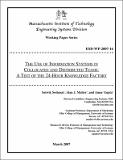The Use of Information Systems in Collocated and Distributed Teams: A Test of the 24-Hour Knowledge Factory
Author(s)
Seshasai, Satwik; Malter, Alan J.; Gupta, Amar
Downloadesd-wp-2007-16.pdf (205.6Kb)
Metadata
Show full item recordAbstract
Recent academic and policy studies focus on offshoring as a cost-of-labor driven activity that has a direct impact on employment opportunities in the countries involved. This paper broadens this perspective by introducing and evaluating the 24-hour knowledge factory as a model of information systems offshoring that leverages other strategic factors beyond cost savings. A true 24-hour knowledge factory ensures that progress is being made on information systems related tasks at all times of day by utilizing talented information systems professionals around the globe. Many organizations currently implement other variants of offshoring that appear similar but are fundamentally distinct. The typical model is a service provider framework in which an offshore site provides service to the central site, often with two centers and a distinction between a primary center and secondary center. Entire tasks are often outsourced to the lower-cost overseas site and sent back when completed. In contrast, the 24-hour knowledge factory involves continuous and collaborative round-the-clock knowledge production achieved by sequentially and progressively distributing the knowledge creation task around the globe, completing one cycle every 24 hours. Thus, the 24-hour knowledge factory creates a virtual distributed team, in contrast to a team that is collocated in one site, either onshore or offshore. By organizing knowledge tasks in this way, the 24-hour knowledge factory has the potential to work faster, to provide cheaper solutions, and to achieve better overall performance. Previous studies have examined individual teams over time and explored various benefits of distributing work to distant teams, but have not directly compared the effect of collocation versus geographic distribution on the use of information systems and the overall performance over time of two real-world teams working on a similar task in controlled conditions. This paper highlights the concept of the 24-hour knowledge factory and tests the model in a controlled field experiment that directly compares the use of information systems and subsequent performance in collocated and globally distributed software development teams. The central finding is that while collocation versus geographic distribution changes the way teams use information systems and interact at key points during a project, each type of team has the potential to use information systems to leverage its inherent advantages, to overcome disadvantages, and ultimately, to perform equally well. In other words, one organizational structure is not inherently superior nor must structure pre-determine performance. Geographic distance introduces new challenges but these can be overcome – and even leveraged for strategic advantage. In sum, our findings suggest that firms can apply the 24-hour knowledge factory model to transition from a service provider framework in which offshoring is a short-term and unilateral cost-saving tactic to a strategic partnership between centers in which offshoring becomes a core component of a global corporate strategy.
Date issued
2007-03Publisher
Massachusetts Institute of Technology. Engineering Systems Division
Series/Report no.
ESD Working Papers;ESD-WP-2007-16